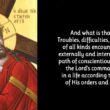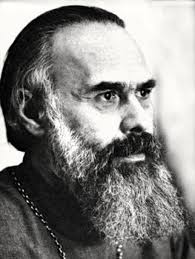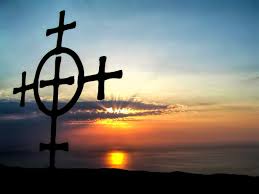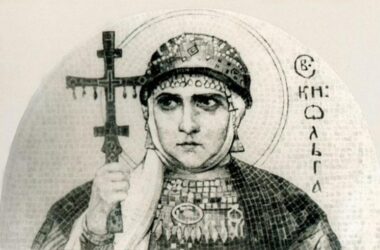In 1972, Metropolitan Anthony of Suroj participated at a discussion broadcast by the British radio station. His interlocutor was the British journalist Anatoly Goldberg (1910-1982), an agnostic born in Riga, Letonia who later emigrated to Great Britain. The discussion that followed became a chapter of a book entitled God: Yes or No? Discussions between believers and nonbelievers:
Your holiness, I have met people who became believers because they were concerned by the manifestation of evil. I have also met people who were disappointed by religion from the same reason. The first category of people considered or came to believe that the two concepts of good and evil could not appear alone so they were created by a greater power. Why good exists it was clear for them of course but they hoped to find the answer in religion for the question about the existence of evil. The second category, of the people disappointed by religion came to the conclusion that religion does not answer at the challenge to reconcile the existence of the Almighty God, who is the embodiment of Goodness and Justice with what it is happening in the world, not only within human relationships but also in nature, that is reigned by chaos, disorder and cruelty. What answer can you give at this question?
It is a very difficult matter meaning that we can start from the same postulate either by faith or by doubt. I think that a Christian would broadly give the following answer: Yes, God is Almighty but He created man as a free being and this freedom brings with it the possibility of goodness or of evil, the possibility to deviate from the Law of life or on the contrary, to take part at this Law. I think that the problem of freedom it is at the bottom of the idea of good and evil. If God had created man incapable of committing mistakes, then he could not do anything positive. For example love cannot be conceived without freedom. You cannot give yourself if it is impossible to refuse to do it, you cannot love someone if this means a mechanical relation. If the freedom to refuse or renounce did not exist, if the possibility of evil did not exist, then love would be nothing more than a simple power of attraction, a power that unites but does not create any relation of morality between those involved.
Why? Could this mean that evil exists only for distinguishing goodness by contrast?
No, I do not think that it exists for this reason, but where it exists the possibility for one, the other follows it inevitably. Of course if we were perfect beings, incapable of making a wrong choice, evil would be excluded, although it would exist as a possibility.
But do you agree that God the Almighty takes care of people, of their fate, helps them and makes sure that evil does not triumph on earth?
Yes, I am very sure about that. Again from a Christian point of view I surely cannot imagine God as an irresponsible one, Who created man, giving him a boundless freedom which could destroy everything (I shall use an image offered by Ivan Karamazov) and He waits somewhere at the end of time for the moment when He judges and condemns the man because he did not use well his freedom. I do not imagine God like this. I imagine God Who created man and life as responsible, not waiting to judge in the end. And the greatest responsibility assumed by God for life and for His deeds, for His act of Creation, is His Embodiment, when God becomes Man, comes in history and becomes partaker of the tragedy, afterwards succeeding to solve somehow this tragedy.
How and where does He allow this tragedy?
He does not allow it in the meaning that death, sickness and infliction can go on destroying people. But the relationship between people may become something completely different. The relation with our own infliction may be something completely different. The relation towards the suffering of the others may again change with this.
This means that you as a Christian negate the theory of Voltaire, who assumes that God created man, gave him what he needed, intellect first of all, then He considered His duty ended. If people use their intellect then everything shall be fine. If not, it is their own business. It is essentially quite a logical explanation. However from what you told me you reject this theory.
Yes. I simply cannot imagine such a God because this would be an irresponsible immoral deed, which would ultimately be the source and the cause of all evil. And I say this because what right would have such a God to create us when He did not assume any responsibility for our deeds and more than that He shall judge us one day for these? What kind of God is this?
Voltaire does not say that He will judge us. He only said that God gave to the man everything he needed, that He created an amazing mechanism and the structure of man, where the intellect is the most important part. Why would that be an irresponsibility? Why would it be blameworthy?
Anatolie Maximovici, if the God you describe had created such a mechanism the things would not go so badly. It would mean that God who created this mechanism is a terrible and slouch mechanic. If this is the God we have, One that is not even able to create an acceptable mechanism, then there is nothing more to say.
But how do you explain the fact that on one hand God cares for people and on the other hand injustice almost always defetead justice throughout the history of mankind? At the beginning this thing was explained by the fact that when the man has problems is his fault, meaning that is a punishment for his sins. Then it seems that the people were not content anymore with this and they started to talk about the way God tries them, tries their faith, thing which resembles the example of Job from the Old Testament, but when this did not satisfy the people anymore Christianity was established and started to convince people that suffering is something good. Do you agree with this presentation somehow simplified of the development of human thought?
I agree only with those explanations you attributed to the past as being something that survived only in those times but I do not see them as some obsolescent things. Evil, hardship and pain suffered by people derive from sin, in the meaning of the wickedness the people have. This causes evil and pain and beside this distorts his self, he becomes a monster and stops being human.
I think that justice in these terms would be quite unappealing. If happiness and prosperity were the imminent prize for kindness then kindness would be a guaranteed moral quality. It would be an easy calculation. I think that kindness becomes kindness indeed when the man bears injustice, suffering and despite these he does not renounce at his meekness, at his idea of kindness or at the objective kindness. If let’s say someone is generous but in the same time he is disappointed by the others and after he tried again once or twice to be kind come to the conclusion that this does not deserve any effort, then his generosity decreases. It is a matter that depends on the type of his reaction. In all respects it seems to me that kindness is tested by being required to face evil. I don’t say that this thing is necessarily good, but without any doubt the man develops himself in a complete new dimension, he acquires a new greatness when he succeeds to face pain, hate, hardships, terrible wars preserving his humanity till the end, even coming to feel compassion, understanding, courage and the power to give and sacrifice himself.
This is after all a complicated process. I agree that the final result is desirable but the process is a very complicated one. It is a very difficult path and it is hard to imagine that the aim could not be reached in an easier way. But tell me: Does God care for the fate of mankind? If it is so, then how do you explain such awful phenomena like it was in the case of Hitler, case which I consider exceptional because there were no attempts to justify those acts of malignity by certain pseudo ethical ideas. It was declared clearly: We want to do evil. How do you explain such phenomena when you sustain that God cares for the fate of mankind?
First of all I am sure that God cares about the fate of mankind. Secondly I think that if there is a freedom of man given by God, He does not have the right to oppose it and destroy it. Otherwise things would be like this: God gives you freedom but in the moment you use it in an inappropriate way He destroys you and you don’t exist anymore. Thus there would be less evil in the world, less evil doers, therefore neither Hitler nor others like him. However in fact the worst evil doer of all would be God Who gives me freedom but Who, when I make mistakes or deviate from the right path because of my folly kills me, destroys me for that. I would say that the moral problem is worse in this case than in the other one…Just imagine how the life of man would be! He would live with the fear that if he does something wrong God destroys him. And here it is something even worse: as long as God knows everything and can anticipate everything when a bad thought comes into our mind He could destroy us! This is worse than a concentration camp! We would live under the sword of Damocles all the time. He shall kill me…maybe not, but yes He shall kill me…no, He will not do it. I am for a million times thankful for a God like the One we have!
Can you repeat?
If God created man really free, free to take responsible decisions which to reflect his deeds, then God has no right to intervene in that freedom. He may enter someone’s life but on an equal footing. As Christ became man and died on the cross. Yes, I understand this. If He had imposed himself on life as God, with His omnipresence and omnipotence and so on when the earthly evil doer endowed with freedom by God uses it in a wrong way would become the victim of the divine anger, meaning that he would be destroyed, killed. And even worse: as soon as the man would think to commit something wrong, God would immediately destroy him, because God knows what would happen. And the entire mankind endowed with that damned freedom would live in an eternal fright. Ah, I had a bad thought, now I will be punished…ah, I just wished something I shouldn’t, what is it going to happen now? That one would be a monster, not a God. He would be the worse evil doer of all.
Then what does it mean divine intervention in the fate of man?
First God inspired the laws of life in man, meaning the wish to fulfill life, the triumphant love. Secondly God gave to the man his conscience about good and evil. He didn’t invent it, it is not only a sociological phenomenon, because sociological forms change permanently while the understanding of good and evil crosses all these.
I totally agree.
More than that: by means of the people who are faithful to Him, who know Him by deeds, prayer and life, God sent His teaching and showed the right path. Because the conscience of man is a relative thing is wavering. He gave the man His Laws, the law of life. The main thing is that God Himself came into history by the incarnation of Jesus Christ. He became Man and showed us by His deed that we can pass through the hardships and pains of life without weakening in love, justice and purity and although this person was destroyed and smashed was not defeated. He reached the absolute mightiness of His humanity and this was a greater victory against evil than if evil hadn’t existed.









